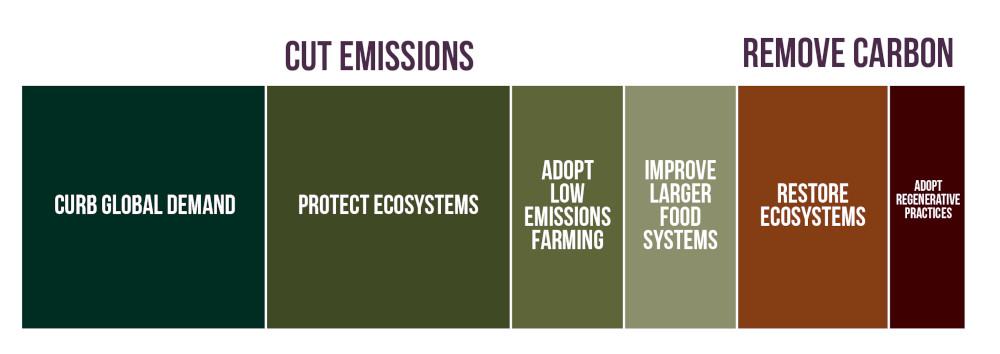When we think of the causes of climate change, fossil fuel use for energy
production, transportation and industry tend to be the first things that comes
to mind — but as we’ve learned, our global food system is equally at fault: A
whopping 22–33 percent of all greenhouse gas emissions come from food,
agriculture and land (and ocean) use.
And while the systems we’ve created to feed humanity have created a huge problem
for Earth’s climate, they also offer huge opportunities to help halt climate
change.
Adding to a growing number of efforts aimed at future-proofing our food system,
including Mars and Unreasonable Group’s Unreasonable Food
program
and the Ellen MacArthur Foundation’s Big Food Redesign
Challenge,
is Project Drawdown’s Drawdown
Food — a major new initiative that
will lead research to define and refine best practices for enhancing global food
security while minimizing adverse climate impacts. Drawdown says it will apply
that research to provide actionable information on ways stakeholders both within
and outside the sector can downsize greenhouse gas emissions from food and
agriculture, and make the most of the land’s capacity to draw carbon dioxide out
of the atmosphere — based on timing, location, ancillary benefits and more.
 Image credit: Project
Drawdown
Image credit: Project
Drawdown
“Using available technologies and
practices,
we can meet every person’s food needs while also neutralizing the food system’s
impact on climate,” says Project Drawdown executive
director Jonathan Foley.
“We just need to apply the right combinations of solutions in the right place at
the right time.”
Drawdown says the food system offers opportunities to reduce greenhouse gas
concentrations in the atmosphere in two main ways: Most of the potential lies in
cutting emissions; additional gains come from removing carbon from the air by
restoring ecosystems and enhancing soil health. Drawdown points to a host of
solutions — including protection of critical ecosystems including
forests,
grassland, peatland, coastal wetlands and coral
reefs;
reducing climate-changing methane
emissions
through innovations in cattle
feed;
greatly reducing food
waste;
scaling regenerative-farming
practices;
and shifting diets to include lesser-known and more climate-resilient
grains
and more
plant-based,
lab-grown
and other alternative
proteins;
and radically improving production of global staple
foods
such as
rice,
beef
and
fish
to eliminate many of the sector’s emissions and other negative environmental
impacts.
Alta Futures and the ZG Foundation will provide
broad support for Drawdown Food’s analyses to better understand the food
sector’s contributions to climate change and how food-sector solutions can best
be deployed to reduce this contribution. Funding from the Global Methane
Hub will allow the Drawdown Food team to
identify and deploy strategies to reduce methane emissions in food, agriculture
and land use; and the Asia Philanthropy
Circle is underwriting work specific to
Southeast Asia.
In the weeks and months ahead, Drawdown says it will share regular reports and
updates through webinars, presentations and research publications. Corporations,
impact funders and philanthropists will have opportunities to tap into the
growing knowledge base and use it to maximize the impact of their climate
efforts.
Get the latest insights, trends, and innovations to help position yourself at the forefront of sustainable business leadership—delivered straight to your inbox.
Sustainable Brands Staff
Published May 14, 2024 6am EDT / 3am PDT / 11am BST / 12pm CEST